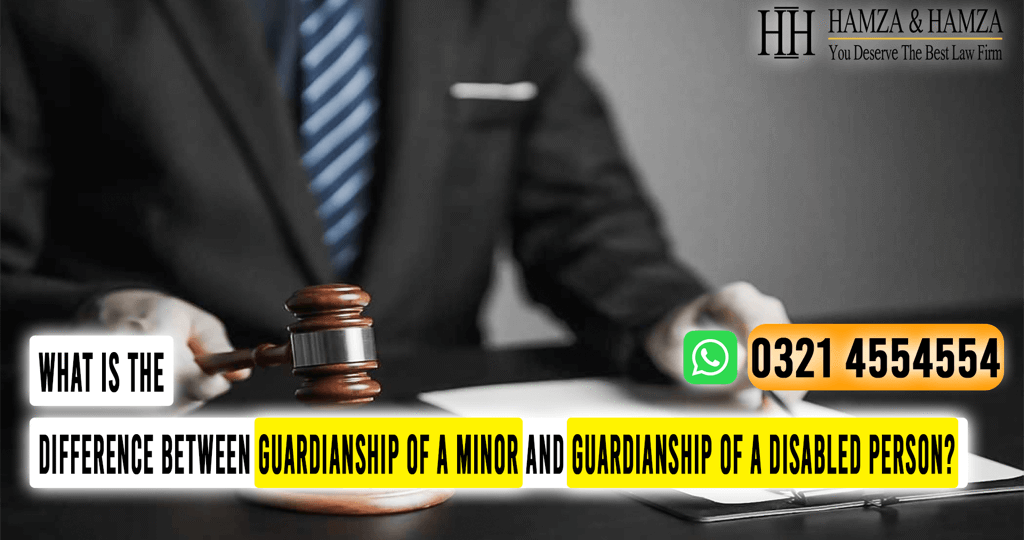
DIFFERENCE BETWEEN GUARDIANSHIP OF MINOR AND GUARDIANSHIP OF DISABLED PERSON
In Pakistan, the concept of guardianship is recognized under different law. However, the law treats guardianship of a minor differently from the guardianship of a disabled person (adult or minor with incapacity). This article aims to draw a difference between guardianship of minor and guardianship of disable persons for better understanding.
- Legal Basis
- Guardianship of a Minor – governed primarily by the Guardians and Wards Act, 1890, which lays down procedures and principles for the appointment of guardians for minors and their properties (i.e., individuals under the age of 18)
- Guardianship of a Disabled Person – Disable person if a minor i.e under 18 years of age, can be covered under theGuardians and Wards Act, 1890 but in any other case, Guardianship involving mentally or physically incapacitated adults is detailed under the Mental Health Ordinance, 2001.
- Age of the Subject
- Minor: A person under 18 years of age. Guardianship is generally required because the minor lacks legal capacity.
- Disabled Person: May be of any age, but usually over 18 years and suffering from mental or physical disability rendering them incapable of managing their own affairs.
- Purpose of Guardianship
- Minor: To protect the child’s welfare, manage the person and property, provide education, healthcare, and upbringing.
- Disabled Person: To assist in medical decision-making, financial matters, personal care, and legal representation, especially if the person cannot understand or manage these aspects independently.
- Initiation of Proceedings
- Minor: Usually initiated by a parent, relative, or someone acting in loco parentis seeking guardianship due to:
- Death of parents,
- Divorce/separation, or
- Dispute between parents.
- Disabled Person: Often initiated by a close family member (like a sibling or parent) when:
- The person is medically certified as unable to manage their affairs, and
- There is a need to make legal, medical, or financial decisions on their behalf.
- Court’s Determination Factors
- For Minor:
- Welfare of the minor is paramount.
- Religion of the child and guardian,
- Capacity and character of the guardian,
- Wishes of the minor (if mature enough).
- For Disabled Person:
- Medical evidence of incapacity is essential.
- Guardian must be competent to manage the specific needs (health, finances, etc.).
- Court may require ongoing supervision or reporting duties.
. Duration of Guardianship
- Minor: Automatically ends when the child turns 18 or if guardian appointed, it ends when minor turns 21.
- Disabled Person: Potentially lifelong, unless the disability ceases or the court is satisfied that the person can resume control of their affairs.
- Types of Guardians
- Minor:
- Guardian of the person,
- Guardian of the property,
- Guardian ad litem (for litigation purposes).
- Disabled Person:
- Guardian of the person and/or property,
- May also involve a court-appointed manager or caretaker for specific tasks.
- Medical Evidence
- Minor: Not usually required.
- Disabled Person: Mandatory. Certification from a qualified doctor or psychiatrist is usually submitted to establish incapacity.
- Consent
- Minor: Minor’s consent may be considered if over age 10, but not binding.
- Disabled Person: If the person has partial capacity, their views may be considered. Otherwise, guardian is appointed in their best interest.
Conclusion
While both processes fall under the broad umbrella of guardianship, the intent, subject matter, and procedural requirements differ significantly. Guardianship of a minor is relatively straightforward and codified, while guardianship of a disabled person often requires judicial interpretation, medical evidence, and greater scrutiny.
Consult your matter with our expert legal team for informed decision.

